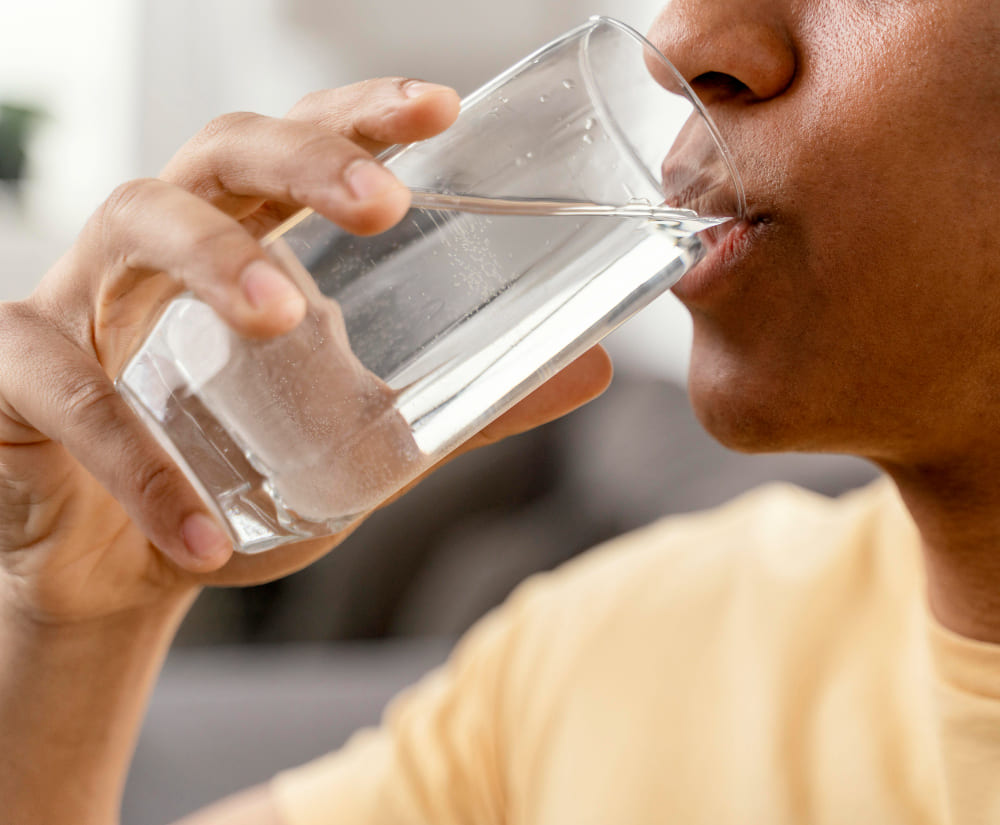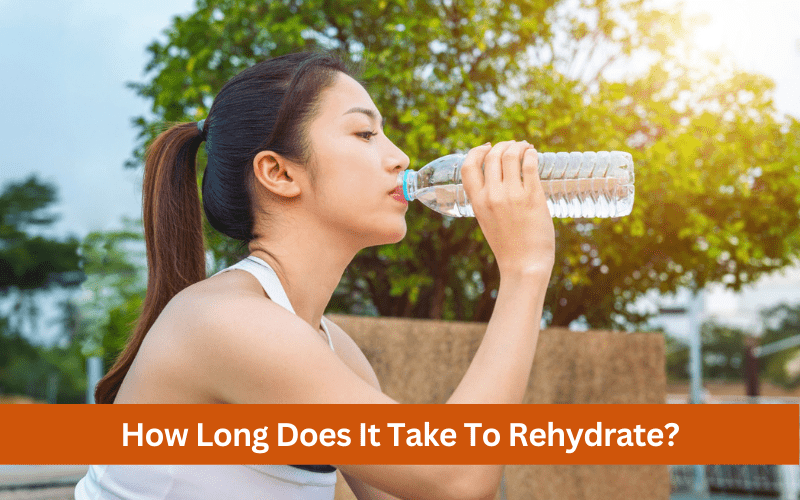It’s a familiar feeling: the morning after a night of heavy drinking, when every movement feels sluggish and your mouth is as dry as the Sahara. As you sit down with a glass of water, you wonder how long does it take to rehydrate? You’ve heard that it’s important to stay hydrated, but how long will it take to feel like yourself again? As someone who has experienced dehydration firsthand, I know how crucial it is to understand the science behind rehydration. In this article, we’ll explore the factors that affect how long does it take to rehydrate and what to do to get your body back to its optimal state. So, grab a glass of water and let’s dive in!
What is Dehydration?
Dehydration is a condition that occurs when the body loses more fluids than it takes in. This leads to an imbalance of electrolytes and water in the body, which can cause a variety of negative symptoms and health effects.
Dehydration can range from mild to severe and can affect anyone, regardless of age or gender. It is important to stay hydrated by drinking enough fluids to maintain the balance of water and electrolytes in the body.
How Long Does It Take to Rehydrate Your Body?
The time it takes to rehydrate your body can depend on various factors, such as the severity of dehydration and the individual’s physical condition.
In general, it can take about 2 hours to fully rehydrate after mild dehydration. However, if the dehydration is severe, it may take longer to restore the body’s fluid balance. It’s important to drink fluids regularly to maintain proper hydration levels.
How long does it take to rehydrate from severe dehydration?
Rehydrating from severe dehydration can take longer than rehydrating from mild dehydration. If the dehydration is not severe enough to require hospitalization, it may take several hours to several days to rehydrate fully.
It is important to rehydrate slowly and consistently, and under the guidance of a healthcare professional if the dehydration is severe.
How long does it take to rehydrate after drinking alcohol?
It may take several hours to fully rehydrate after drinking alcohol, especially if the individual is experiencing hangover symptoms such as headache or nausea.
Alcohol is a diuretic, which means it increases urine production and can lead to dehydration. The time it takes to rehydrate after drinking alcohol can vary depending on the amount consumed and the individual’s physical condition.
How long does it take to rehydrate with IV fluids?
It may take up to an hour for the body to process a liter of water through the bloodstream when consumed orally, whereas an IV catheter can deliver fluid directly into the vein immediately for rapid rehydration. The time it takes to rehydrate with IV fluids can depend on the individual’s level of dehydration and response to treatment.
How long does it take to rehydrate with water?
In general, it can take anywhere from 30 minutes to several hours to fully rehydrate. When you drink water, your body can start to absorb it within a few minutes. The time it takes to fully rehydrate depends on factors such as how much water you need, how dehydrated you are, and how efficiently your body can absorb and retain water.

Can It Take Days to Rehydrate?
Yes, it can take days to rehydrate, especially if the dehydration is severe. Severe dehydration occurs when the body loses a significant amount of fluids and electrolytes, which can lead to serious health problems if left untreated.
Rehydration for severe dehydration often involves medical attention and may require intravenous fluids to restore proper hydration levels.
How Long Does It Take to Rehydrate Your Brain?
Dehydration can affect various parts of the body, including the brain. The time it takes to rehydrate the brain can vary depending on the individual and the severity of dehydration.
However, studies have shown that even mild dehydration can lead to cognitive decline, affecting memory, concentration, and overall brain function. Rehydration is critical to restoring proper brain function, and it is recommended to drink fluids regularly to avoid dehydration in the first place.
How Long Does it Take to Hydrate?
When you drink water, your body can start to absorb it within a few minutes. The time it takes to fully hydrate depends on factors such as how much water you need and how dehydrated you are. In general, hydration might take as little as a few minutes or as long as many hours.
Factors that Affect How Long Does It Take to Rehydrate?
The time it takes to rehydrate can be affected by a number of variables:
- Severity of dehydration: The more severe the dehydration, the longer it can take to rehydrate fully.
- Age: Children and the elderly may require more time to rehydrate, as their bodies may not be as efficient at retaining fluids.
- Body weight: A person’s body weight can affect how much fluid they need to rehydrate fully.
- Underlying health conditions: Certain health conditions, such as kidney disease, can affect how quickly the body can rehydrate.
- Type of fluid consumed: Different fluids are absorbed by the body at different rates, which can affect how quickly the body can rehydrate. For example, sports drinks with electrolytes may be absorbed faster than plain water.
- Physical activity: Exercise or strenuous activity can cause dehydration, which may require more fluids and time to rehydrate.
- Medications: Certain medications can cause dehydration, which may affect how long it takes to rehydrate fully.
Keep these factors in mind when trying to rehydrate, and to consume fluids regularly to maintain proper hydration levels. If dehydration is severe or accompanied by other symptoms, seek medical attention.

What are the Symptoms of Dehydration?
The symptoms of dehydration can vary depending on the severity of dehydration, but some common signs and symptoms include:
- Thirst: Feeling thirsty is often one of the first signs of dehydration.
- Dry mouth and throat: A dry mouth and throat can be a sign of dehydration, as the body is not producing enough saliva.
- Dark yellow urine: Dehydration can cause urine to become darker in color, indicating that the body is retaining less water.
- Fatigue: Dehydration can lead to feelings of fatigue and weakness, as the body is not getting enough fluid to properly function.
- Dizziness or lightheadedness: A lack of fluids can cause a drop in blood pressure, leading to feelings of dizziness or lightheadedness.
- Headaches: Dehydration can lead to headaches, as the brain may not be getting enough fluids to function properly.
- Dry skin: Dehydration can cause the skin to become dry and less elastic.
- Muscle cramps: A lack of fluids can cause muscles to cramp, especially during exercise.
- Rapid heartbeat: Dehydration can cause the heart to work harder, leading to a rapid heartbeat.
- Confusion or irritability: Severe dehydration can cause confusion or irritability due to the effects on the brain.
What Causes the Dehydration?
Dehydration occurs when the body loses more fluids than it takes in, leading to an imbalance of electrolytes and water in the body. There are several factors that can cause dehydration, including:
- Inadequate fluid intake: Not drinking enough fluids can lead to dehydration.
- Excessive sweating: Sweating can cause the body to lose fluids, especially during exercise or in hot weather.
- Diarrhea and vomiting: These conditions can cause the body to lose fluids and electrolytes rapidly.
- Fever: A fever can cause the body to lose fluids more quickly than normal.
- Medications: Certain medications, such as diuretics, can cause the body to lose fluids and electrolytes.
- Diabetes: High blood sugar levels in people with diabetes can cause frequent urination, which can lead to dehydration.
- Alcohol and caffeine: These substances can act as diuretics, causing the body to lose fluids more quickly.
- Medical conditions: Certain medical conditions, such as kidney disease or cystic fibrosis, can affect the body’s ability to regulate fluids and lead to dehydration.

How Can You Prevent Dehydration?
The following are some things you can do to avoid dehydration:
Drink fluids regularly
The best way to prevent dehydration is to drink fluids regularly throughout the day. Water is the best choice, but other fluids such as sports drinks, coconut water, and herbal teas can also help.
Pay attention to your body
Pay attention to your thirst levels and monitor the color of your urine to ensure you are drinking enough fluids.
Avoid diuretics
Avoid or limit alcohol and caffeine, as these substances can act as diuretics and cause the body to lose fluids more quickly.
Stay cool
In hot weather, take breaks in the shade or indoors to avoid excessive sweating and dehydration.
Eat hydrating foods
Fruits and vegetables with high water content, such as watermelon and cucumbers, can help keep you hydrated.
Be mindful during exercise
Drink fluids before, during, and after exercise to replace fluids lost through sweat.
Take breaks during intense activity
Take breaks during intense activity to rest and rehydrate.
Consider electrolytes
In addition to water, consuming electrolytes such as those found in sports drinks can help replace fluids lost during exercise or sweating.
By taking these measures, you can help prevent dehydration and stay hydrated, which is crucial for overall health and well-being.
What Can You Do If You are Dehydrated?
If you are dehydrated, you can take the following steps to help rehydrate:
- Drink fluids: The best way to rehydrate is to drink fluids. Water is the best choice, but other fluids such as sports drinks or coconut water can also help.
- Rest: If you are dehydrated, take a break from physical activity and rest until you feel better.
- Seek medical attention: If your dehydration is severe or accompanied by other symptoms such as dizziness or confusion, seek medical attention.
- Replenish electrolytes: If you are dehydrated due to sweating or exercise, replenishing electrolytes with a sports drink or electrolyte supplements can help restore balance.
- Consume hydrating foods: Fruits and vegetables with high water content, such as watermelon or cucumber, can help rehydrate the body.
- Avoid diuretics: Avoid or limit substances that act as diuretics, such as alcohol or caffeine, as they can worsen dehydration.
- Use a cool compress: If you are dehydrated due to heat exposure, a cool compress can help reduce symptoms and promote rehydration.
Remember, prevention is key when it comes to dehydration. It’s important to stay hydrated by drinking fluids regularly and to be mindful of activities or situations that may increase the risk of dehydration.
How Much Water Does It Take to Rehydrate?
In general, it is recommended to consume at least 8-10 cups (64-80 ounces) of water per day to maintain proper hydration levels. To rehydrate after mild dehydration, consuming 1.5 times the amount of fluid lost can be effective.
For example, if you lose 2 cups of fluids through sweating or exercise, you may need to consume 3 cups of water to rehydrate fully.
How Much Gatorade Does It Take to Rehydrate?
Gatorade is a sports drink that contains electrolytes, which can help replenish fluids lost during exercise or sweating.
The amount of Gatorade it takes to rehydrate can depend on several factors, including the individual’s level of dehydration and physical activity.
As a general guideline, it is recommended to consume around 17-20 ounces of Gatorade for every pound of body weight lost during exercise or sweating.
However, it’s important to balance Gatorade consumption with plain water, as consuming too much Gatorade can lead to excessive sugar and calorie intake.
FAQs
What hydrates faster than water?
Sports drinks with electrolytes can hydrate faster than water, as they contain electrolytes that help replenish fluids lost through sweat.
Does it take 2 days to hydrate?
The time it takes to hydrate can vary depending on several factors, such as the individual’s level of dehydration and the type and amount of fluid consumed. While mild dehydration can be corrected within a few hours of consuming fluids, severe dehydration may require several days of rehydration.
Is Coke more hydrating than water?
o, Coke is not more hydrating than water. In fact, the sugar and caffeine content in Coke can act as a diuretic, causing the body to lose fluids more quickly.
Is it better to sip or chug water to hydrate?
It is better to sip water regularly throughout the day to maintain proper hydration levels, rather than chugging large amounts at once. Sipping water allows the body to absorb fluids more efficiently and helps prevent overhydration.
Why do I get dehydrated so easily?
Several factors can increase the risk of dehydration, such as excessive sweating, certain medications, medical conditions that affect fluid balance, and not drinking enough fluids regularly.
Are bananas good for dehydration?
Bananas are a good source of potassium, which can help replenish electrolytes lost during sweating. They can be a healthy snack option to help maintain proper hydration levels.
Can you be dehydrated for months?
While it is rare to be dehydrated for months, certain medical conditions such as kidney disease or cystic fibrosis can affect the body’s ability to regulate fluids and electrolytes, leading to chronic dehydration.
Does dehydration get worse as you age?
As the body ages, it may become less efficient at retaining fluids, making older adults more susceptible to dehydration. Certain medications commonly used by older adults can also increase the risk of dehydration.
Is yogurt good for dehydration?
Yogurt is not a significant source of fluids, but it does contain electrolytes such as potassium, calcium, and magnesium, which can help replenish fluids lost through sweating. However, it should not be relied upon as a sole source of hydration.
What happens if you are dehydrated for too long?
If you are dehydrated for too long, it can lead to serious health complications. Severe dehydration can cause electrolyte imbalances, which can lead to seizures, kidney failure, or even death. Prolonged dehydration can also cause cognitive impairment, fatigue, weakness, and low blood pressure.
Conclusion
After personally experiencing the unpleasant effects of dehydration, I can confidently say that understanding how long does it take to rehydrate is essential for maintaining good health. As we have seen, rehydration time can vary depending on several factors mentioned above. However, it’s important to note that waiting until you feel thirsty to drink water is not enough to maintain proper hydration levels. Consistently drinking fluids throughout the day is key to staying properly hydrated. It is also important to choose fluids that are appropriate for the situation, such as sports drinks for strenuous activity or water for daily hydration. So, if you find yourself dehydrated, don’t wait to drink fluids. Start rehydrating as soon as possible to prevent further complications and restore your body’s natural balance.
I’m Chen Mina, from Vol de Nuit, who has a special passion for bartending, especially mixing wine, beer, and cooktail. Here you will find content about alcoholic beverages, I will bring you knowledge that few people know about this drink.





